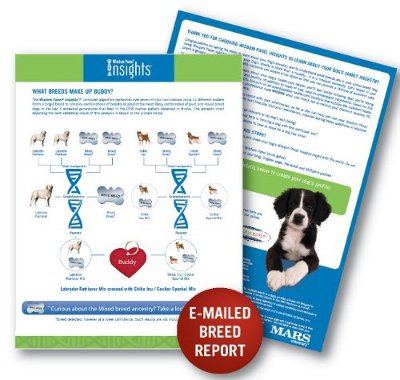One of the joys of owning a mixed breed dog is speculating on its makeup. Is it part German Shepherd? Pug? Some sort of Spaniel? Maybe there’s some Terrier in there somewhere?

It’s a fun guessing game despite (or perhaps because of) the fact that there’s no definitive answer.
At least, that used to be the case.
These days, you can order a dog DNA test kit and get a detailed report on which breeds are barking up your mutt’s family tree. Canine DNA testing has been around since 2007, and has gotten better and more affordable since then. Now, for less than $100, you can settle the issue of your dog’s breed (or breeds) once and for all.
Just don’t take these tests too seriously. Different test kit brands can produce dramatically different results (suggesting that at least some of these products aren’t 100% accurate).
Also, unlike more sophisticated genetic tests, these at-home kits won’t tell you whether your individual dog is predisposed to health problems. The manufacturers often stress that their products are for informational purposes only.
Note: This article contains affiliate links. That means the website owner receives a commission when you buy one of the products listed here.
How a Dog DNA Test Works
Most canine DNA test kits are available online and are simple enough for any ordinary dog owner to use. They generally include swabs for taking a DNA sample from your dog’s inner cheek (however, one test on the market requires you to submit a blood sample through your vet). Once you have the sample, you simply use the provided envelope to send it to the company’s lab for processing.
When analyzing a sample, the lab compares the genetic markers against its database of breeds. Of the products currently on the market, Wisdom Panel Insights has the largest database, with around 200 breeds.

Before buying a product, you should make sure the company’s database includes any and all breeds you suspect for your dog – otherwise the test results might be disappointingly inconclusive.
Once the lab testing is complete, the company sends a report back containing any breed matches for the dog. Generally the closer the test subject is to purebred, the more successful the test will be. If the dog is the product of several generations of mutts, the report may have lots of holes in it.
Why Knowing Your Dog’s Breed(s) is Important
For a lot of dog owners, mere curiosity is enough to justify the cost of a canine DNA test. Given the amount of money people spend on their dogs, it seems like a small expense to learn something new about your best bud. For extra fun, your family and friends could place wagers on the dog’s breed and use the test results as the final arbiter.
However, there’s also a practical reason to learn about your dog’s background. Knowing what breeds are part of your dog’s makeup can help you and your vet anticipate health issues that might come up.
As a group, mixed breed dogs are healthier than purebreds because they come from a larger gene pool. Still, mutts that have a high percentage of a particular breed in them may be susceptible to a lot of that breeds’ particular health problems.
Another important use of DNA tests is confirm that you’ve gotten the dog you actually paid for.
Purebred dogs and designer dogs (mixtures of two pure breeds) can cost thousands of dollars. People who are considering one of these dogs, or fear that they’ve already been ripped off, might want to use one of these services to make sure.
To Test or Not to Test
Are DNA tests necessary or even advisable for every mutt?
Not really.
If you know at least one of the dog’s parents, or if it strongly resembles one or more breeds, a test will likely only confirm your suspicions.
On the other end of the spectrum, if your dog has the prototypical mutt appearance (mid-sized, with fawn or black coat), it might be so mixed that a DNA test won’t tell you anything significant.
For dogs in-between those two extremes, a DNA test is probably worth the price. Not only is it just plain fun, but it can give you a better understanding of your dog.
